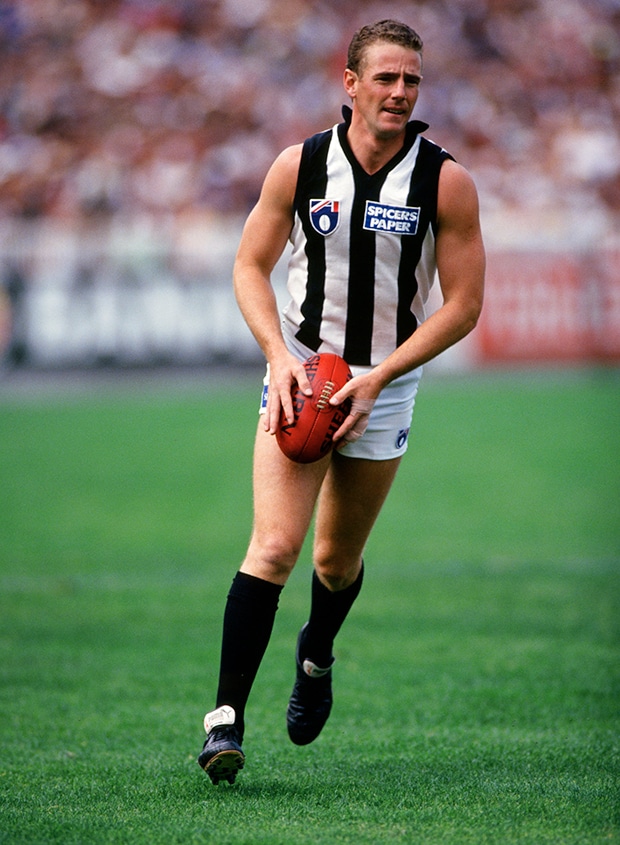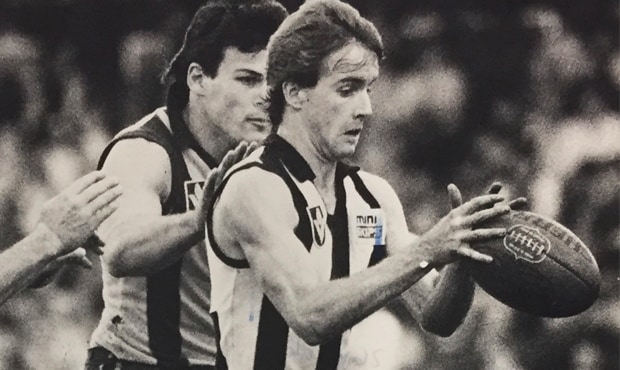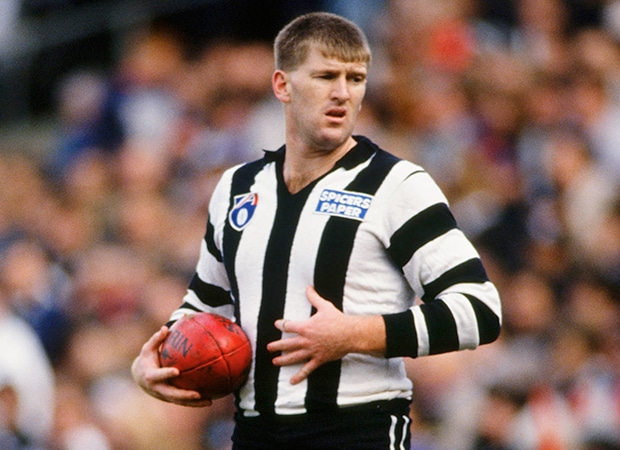It was the era of mullets and moustaches; a time when tight shorts and lace-up jumpers were the trends; and when footy expansion meant national, not international as it does today.
Remember the ‘80s?
If you can, you will recall it as one of the most volatile periods in Australian football history. It was a time of seismic change which dragged a near-broke Victorian Football League – with its 12 parochial clubs who played predominantly on suburban grounds each Saturday afternoon (often on muddy grounds) – towards the Australian Football League of today – when 18 clubs play in every state and territory at an assortment of times during the day and night (often under a roof).
If can’t recall them, you missed a remarkable decade for the game, and for Collingwood.
But don’t fret; Collingwood Forever plans to transport you back in time each week for a blast from the 1980s past, profiling a player who made an impact for one reason or another during that decade. They might not have all been stars, but each contributed to one of the club’s most tumultuous periods.
Jamie Turner
In an era before versatility was an AFL pre-requisite, Jamie Turner might well have been deemed the ultimate utility.
Across 10 seasons and 160 games, there were few positions this adaptable, remarkably durable footballer wasn't asked to play at stages of his career with Collingwood. He may not have mastered them all, but he was always ready, willing and able to play wherever his team needed him.
Turner ranged from playing on the wing to a running half back, from the back pocket on occasions to the centre, even as a ruck rover at times. He could be swung around to various positions where the coach needed him, and on the most celebrated day in his career, he came off the interchange bench.
“I didn't mind it, I like it (playing a variety of positions), it makes the game different,” Turner told the Herald Sun during his career. “It helps you, too.”
“If someone is playing well in a position and you can't get that spot, it's good that you can play somewhere else.”
Turner always dreamt of emulating the feats of his famous father, Ken, who achieved the ultimate when he was one of Collingwood's best players in the 1958 premiership side. He was even pictured as a young child in a Black and White jumper kicking a ball in front of his father, while club greats Des Tuddenham and Harry Collier watched on.
But Turner's pathway towards carving a successful career never came easily. He had to work hard for all that came his way, yet always put the team ahead of his own requirements.
He was recruited as a teenager from Montmorency - another club with black and white stripes - to Collingwood in 1980. However, his under 19s coach, Keith Burns, had initial reservations on whether he was going to be good enough.
“He played pretty ordinary football,” Burns said of Turner’s first year in the under 19s. "But then Jamie worked his butt off over summer and ended up (as) captain next year. Players can always improve, especially if they have the right attitude.”
Turner's father noted one thing during his time with the under 19s, telling the Sun newspaper years later that “he was always in there helping and shepherding and doing a lot of hard work and I think from that time that's how he's continued to play football - as a real team man.”
His graduation to training with the senior group brought with it a nickname that lasted nearly his entire league career – the slightly unflattering ‘Nerky’.
It came when Magpie veteran of the time, Ray Byrne. Turner recalled: “He (Byrne) kept on forgetting my name, so he called me Fred Nerk.” That was later shortened to ‘Nerky’, and some of his teammates called him that until he retired.
Turner had initially been “too skinny” to play against bigger bodied players, but went too far the other way when he tried to put on weight.
It wasn't until 1984 that he finally got his chance to play a senior league game - as a 21-year-old - after a strict diet saw him shed almost eight kilos.
“I was a big eater… I used to have a couple of toasted sandwiches at morning tea and a couple of rolls for lunch,” Turner said. “I wasn't fit and I found, as the games progressed, I was getting tired and my skills dropped.”

Jamie Turner runs down the MCG wing during the 1993 season.
That changed when he played 14 games in his debut year, including the Elimination Final against Fitzroy, and he won Collingwood's Most Improved Award.
But just as he had seemingly secured a spot within the senior team a debilitating back injury kept him on the sidelines for all but the final game of 1985.
Turner played 21 games in each of the 1986 and 1987 season, with the former year being his best for the club. He was well rewarded on Copeland Trophy night in 1987, when he was third in the best-and-fairest, and he was adjudged the Best Clubman, as well as winning a second most improved award.
He even polled eight Brownlow Medal votes and made the Victorian squad, even if he narrowly missed out on the team.
“I had a couple of good games that year,” he said in an understatement. “I tackled a bit more than I usually do.”
At the time, the Sun's Lou Richards, wrote: “Jamie Turner doesn't get many wraps from the media, but whenever the coach gives him a job to do, he does it extremely well. If ever there was a kid who is a chip off the old block it is young Jamie, the son of Ken Turner, one of the ‘immortals’ who won Collingwood's last premiership in, ‘sob’, 1958.”
Unassuming in the way he approached his football, Turner was described as “nothing flashy… in a working man's club, he is a worker's player - determined, dour and someone who is prepared to risk life and limb for his team.”

Electrifying Eighties - A loved rover's big year: Click here to read Glenn McFarlane's feature on Matthew Ryan's 1987 campaign.
One game against Geelong in 1989 summed up his capability of playing different roles at different times. He started in a back pocket on Spiro Malakellis before going into the centre to try and limit the impact of Paul Couch.
Turner was a consistent ball winner, having more than 400 disposals across four seasons (1987-90), albeit his kicking early in his career wasn't as strong as it could have been, evidenced by the fact a few of his teammates jokingly dubbed him ‘Apple’ as in Apple Turnover.
His captain, Tony Shaw, said in his book, A Shaw Thing, "We always put s---- on him because he kept kicking the ball to the opposition… then we found out that he couldn't see properly. He was as blind as a bat. He got contact lenses halfway through the (1990) season and his kicking improved out of sight, so to speak.”
That 1990 season would provide Turner, and Collingwood, with an incredible highlight, though it wasn't without some anguish. As the Magpies built towards that elusive premiership, the pressure of retaining his spot within the side was revealed in Brian Taylor's BT Diaries.
Taylor described the scene in the Collingwood rooms ahead of the Second Semi-Final against Essendon: “Lying on a bench was Turner, who had been vomiting; such was his anxiety about possibly being dropped from the final 20.”
He kept his spot, and did the same in the Grand Final a fortnight later, which meant he ended up playing every game in that celebrated season.
While he didn't have a massive impact on the game, he had joined his father as a Collingwood premiership player, having 10 disposals but winning that cherished premiership medal.

Electrifying Eighties - A quiet bloke who got the job done: Click here to read Glenn McFarlane's feature on Ron McKeown's time at Victoria Park.
In the victorious rooms, he would say: “I thought I was going to run out of time to catch up with Dad (winning a flag). It won't sink in for a while. After the game Dad just said to me: “You've won, you've won!”
Tony Shaw sensed Turner’s relief when he went over to him in the chaotic scenes in the dressing rooms, saying “Hey, bugger Kenny Turner, ‘Nerky’, this is us now.” He would say of Turner: “I reckon he could play anywhere (on the field). He just keeps getting the nut.”
Turner received external kudos the following year when selected to play for Victoria against Tasmania, though he suffered a back injury during the game.
He still managed 19 games that season, but only 11 in 1992, having been omitted from the club's Elimination Final against St Kilda.
Only three more games followed in 1993, before he retired from the AFL, having played only 10 fewer games than his father, and having joined him as one of rare breed of father-sons to have played in VFL-AFL premiership sides.
Shaw would describe Turner as “totally loyal to Collingwood” and coming from his premiership captain, there can be no greater compliment.
Turning Points
Written by Glenn McFarlane of the Herald Sun
A lasting impact: Greg Phillips
A loved rover's big year: Matthew Ryan
A comet in the Magpie sky: Phil Walsh
A senior debut at sweet 16: Terry Keays
A quiet bloke who got the job done: Ron McKeown


